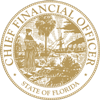2020 Press Releases
**Consumer Alert** CFO Jimmy Patronis: Beware of Fake Check Scams
TALLAHASSEE, Fla. – Today, Chief Financial Officer (CFO) Jimmy Patronis warns Floridians and especially business owners to be cautious of fake check scams as a recent report highlighted the arrest of a Walton County man for grand theft of a motor vehicle after allegedly printing fake checks from his home computer.
CFO Jimmy Patronis said, “The Federal Trade Commission estimated that Florida lost nearly $90 million to fraud last year alone. It is vital that all business owners watch out for scam artists and stay on guard when it comes to accepting large amounts of money in the form of a personal or business check. If you feel you’ve fallen victim to fraud, report it immediately at FraudFreeFlorida.com. I commend the Walton County Sheriff’s Office for bringing this alleged fraudster to justice before he could scam another business.”
Tips to Spot a Fake Check
1. Make sure the check was issued by a real bank. While some counterfeit checks will include a legitimate bank’s name, a fake name is a sure giveaway. The FDIC has a tool that allows you to locate FDIC-insured banking institutions in the United States.
2. Check with the bank that issued the check to make sure it is real. Make sure you look up the phone number on the bank’s official website and don’t use the phone number printed on the check (that could be a phone number controlled and answered by the scam artist). Next, call the official number and ask them to verify the check. They will likely need to know the check number, issuance date, and amount.
3. Determine if the amount of the check is correct and as expected. Fake checks are often made out for more than the agreed upon amount. This is intended to coax the person receiving the check into wiring the overpayment back to the scammer.
4. Check for signs of legitimate checks. Official checks usually contain watermarks, security threads, color-changing ink and other security features. While scammers are able to sometimes copy these security features, the quality is often poor.
5. Report signs of fraud immediately. If you think you’ve been targeted by a counterfeit check scam, report it immediately at FraudFreeFlorida.com.
